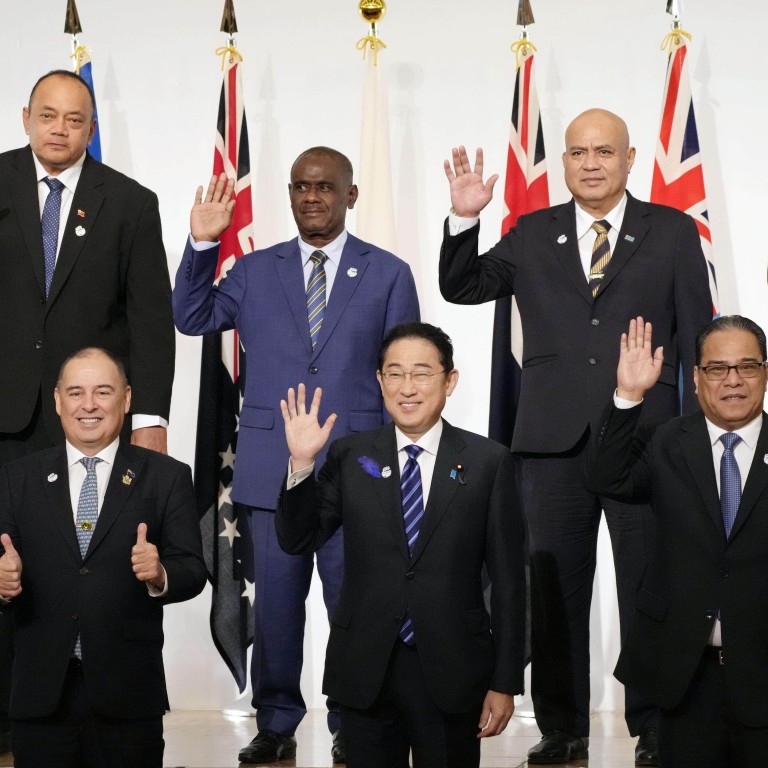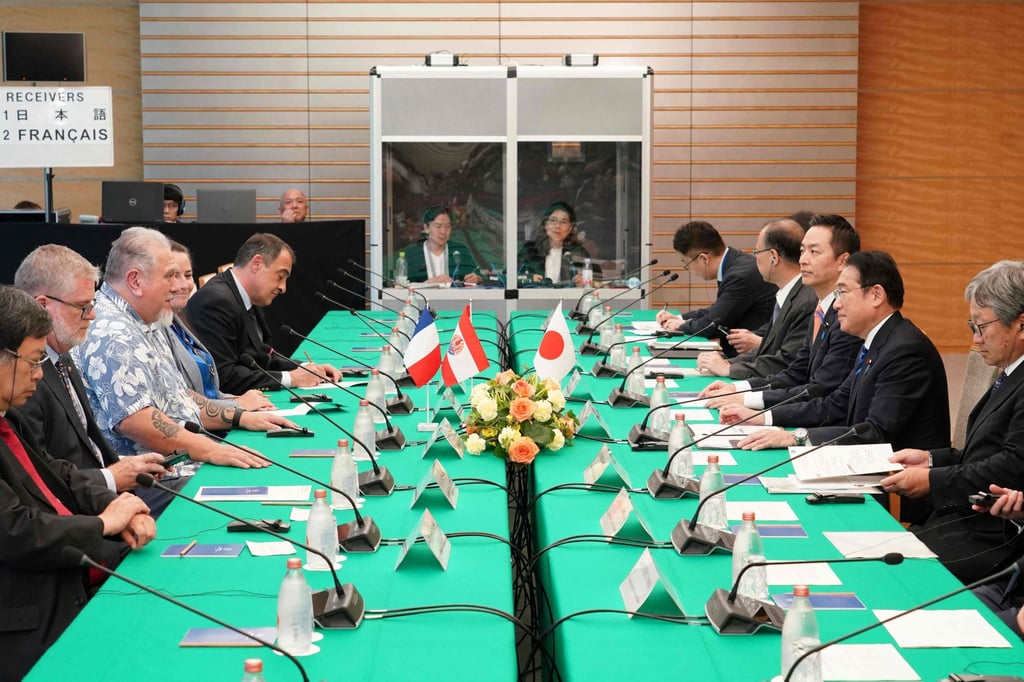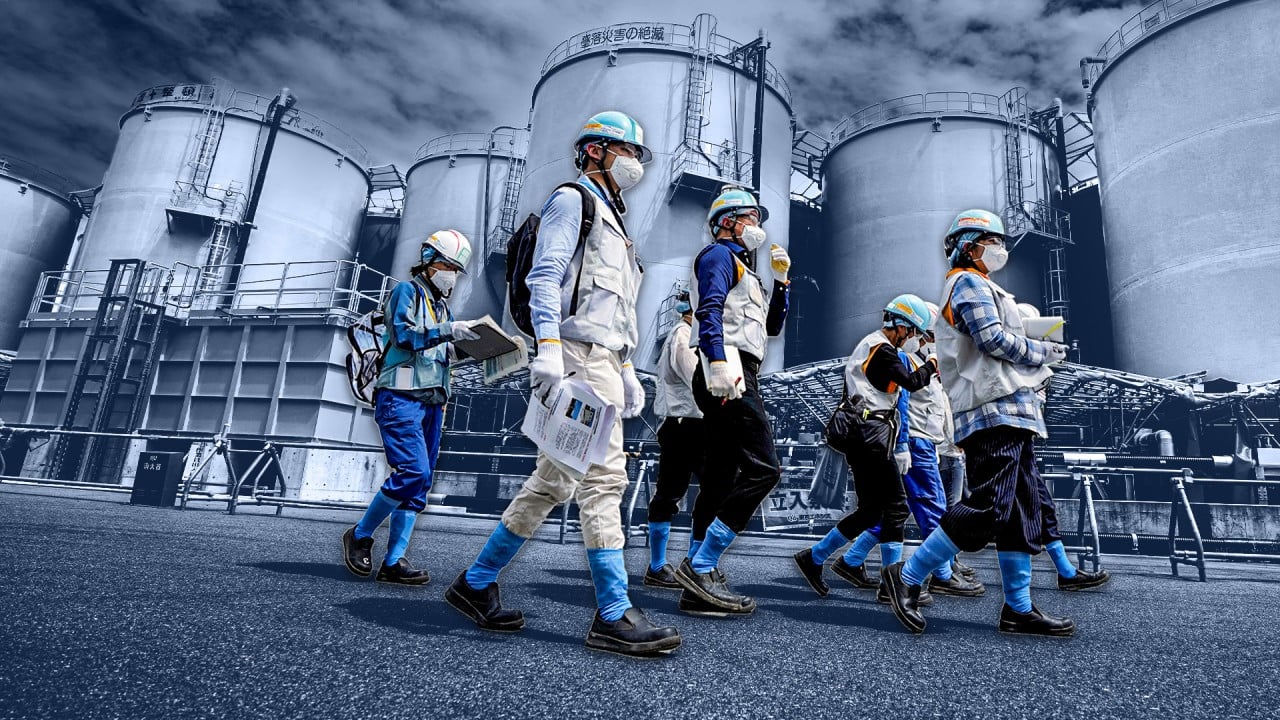
Japan’s talks with Pacific islands focus on climate as security issues take back seat
- Among the areas of concern highlighted by Pacific island nations was Japan’s release of treated radioactive water
Japanese and Pacific island leaders largely focused on climate change at their recent meeting even though Tokyo was keen to discuss security cooperation amid China’s growing military and economic influence in the region.
The environmental hot potato was a “major priority” for Pacific island nations while Japan was setting its sights on boosting security initiatives in partnership with its allies, according to observers.
At the talks held in Tokyo from Tuesday to Thursday, participants said they opposed “any unilateral attempt to change the status quo by force”, in an inference to territorial disputes including the South China Sea.
The 10th Pacific Islands Leaders Meeting was attended by Japanese Prime Minister Fumio Kishida and representatives from 18 members of the Pacific Islands Forum (PIF), a regional body that also includes Australia and New Zealand.
The other 16 countries are the Cook Islands, Federated States of Micronesia, Fiji, Kiribati, Marshall Islands, Nauru, Niue, Palau, Papua New Guinea, Samoa, Solomon Islands, Tonga, Tuvalu, Vanuatu, French Polynesia, and New Caledonia.
Kishida said Japan would work with its Pacific counterparts over the next three years in areas including climate change, economic development, disaster resilience and decarbonisation.

Both sides also agreed to strengthen defence exchanges through port calls with the involvement of vessels and aircraft from the Japan Self-Defence Forces and boost cooperation between the Japan coastguard and local maritime authorities.
Hideyuki Shiozawa, director of the Division of Island Nations at the Sasakawa Peace Foundation, said the meeting’s focus on climate change was not a surprise as Pacific island nations had prioritised the issue.
While regional security and military concerns were also important, Japan could not tackle such challenges alone and needed to work with the US, the UK, Australia and New Zealand in these areas, Shiozawa said.
Northern and southern hemisphere Pacific island countries have different views on security, according to Shiozawa.
While the former – Micronesia, Marshall Islands, and Palau, or the Freely Associated States – had enhanced security cooperation with Japan and the US, the southern hemisphere countries in the region typically emphasised humanitarian response, cybersecurity and illegal fishing, Shiozawa said.
In March, Washington approved legislation for funding of US$7.1 billion over 20 years for the Freely Associated States, aimed at countering China’s growing influence in the region.
In February, Japan conducted cyber defence drills with five island nations – the three Freely Associated States, Nauru and Kiribati.

The increased focus by the US and Japan on Pacific island countries comes amid China’s rising influence in the region. In 2022, Beijing signed a security pact with the Solomon Islands.
Céline Pajon, head of Japan research at the French Institute of International Relations’ Centre for Asian and Indo-Pacific Studies in Paris, said Japan was keen to counter China’s growing influence through security cooperation.
Japan would continue to step up bilateral cooperation with Pacific island countries in security and defence, and within multilateral settings, Pajon said.
For instance, Japan is jointly addressing various issues with its allies through the Indo-Pacific Maritime Domain Awareness (IPMDA) partnership and Partners in the Blue Pacific (PBP), both of which were established in 2022.
The former was established by the Quad – comprising Australia, India, Japan and the US – aimed at monitoring regional maritime spaces and securing open sea lines of communication.
The latter – founded by Australia, Japan, New Zealand, the UK and the US – is tasked with boosting economic and diplomatic ties with Pacific island nations.

Fighting wastewater disinformation
Jamie Lee, a WSD-Handa research fellow at the Honolulu-based Pacific Forum, said Japan should do more to address the region’s security challenges, noting that China had launched disinformation campaigns targeting Pacific island countries.
“As a trusted partner and US ally, Japan could become an active leader in addressing disinformation campaigns targeting the Pacific islands by funding workshops on identifying disinformation,” said Lee, an analyst of Japanese affairs and regional security.
China is said to be targeting the Pacific island nations online to undermine their democracies and relationships with other partners, according to a report by the Australian Strategic Policy Institute released in March.
At the Tokyo meeting, Kishida addressed concerns about the discharge of wastewater from Japan’s Fukushima power plant. He said Japan would continue to reassure Pacific island countries about the safe release of its treated radioactive water. Analysts have said the phased release of treated wastewater into the Pacific Ocean is expected to take three decades.
According to Lee, Japan should maintain transparency in its data collection and enhance communication with the Pacific island countries, including fighting disinformation at every stage of its wastewater release.
According to a 2023 report by Logically, the UK-based data analytics company claimed that China and its state media had been running a disinformation campaign on Japan’s wastewater release. It included running paid ads on Facebook and Instagram in multiple countries and languages without including any disclaimers.
Meanwhile, the Global Times said on Monday that Japan, the US and their allies wished to turn the South Pacific region into “a military base … even weaponise the Pacific Island countries”.
Citing analysts, the Chinese state tabloid also accused Japan of not “hiding its wild ambitions to expand influence in the Asia-Pacific region” and accelerating its military expansion far beyond its needs of “self-defence”.
“The Pacific island countries are now most concerned about climate change, while Japan is trying to persuade the region to accept its handling of nuclear-contaminated water,” it said.
Lee said the dissemination of accurate information by Japan on radiation levels arising from its wastewater release would help shape the stance of every Pacific island country on the issue.
Noting that the treated water had been proven to be scientifically safe, Shiozawa said Japan should provide a careful explanation of its wastewater release procedures to underpin confidence in its technology.
“I hope that there will be no approach to force the Pacific island countries to understand or to accept that other countries say it is safe so the Pacific island countries should accept it too,” Shiozawa added.


